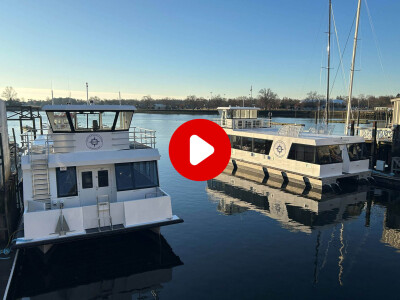While describing many heroic incidents in which Coast Guard personnel saved lives on land and at sea over the past year, Coast Guard Commandant Adm. Linda Fagan also used her annual State of the Coast Guard address to warn of the many challenges facing the 233-year-old maritime service.
“Last year, the Coast Guard saved nearly 5,000 lives and ensured the safety of thousands more through our operations to prevent maritime accidents before they happen,” the admiral said in her March 20 speech. “Additionally, our crews continued their work to deter maritime migration through the Pacific, the Caribbean and the Straits of Florida by responding to large numbers of people taking to the sea on incredibly hazardous voyages.”
But, she added, challenges to the organization are “rapidly evolving,” as the Coast Guard makes progress to address its gaping labor shortage (4,800 people short of what it should be), modernize its assets, infrastructure and workforce policies, and deal with sexual harassment and misconduct within its ranks.
Fagan said the service is employing sophisticated technologies such as analytics and artificial intelligence to advance its missions and reform how it recruits, trains and supports its workforce.
“We are moving away from a rigid, one-size-fits-all system, “ she said, “to one that enables every individual to perform to their full potential. It’s a generational change in our approach to talent management.”
She explained that demand for Coast Guard services is growing across the country and the globe, where personnel and assets are especially active in Africa, the Pacific and the Arctic.
She said for decades the Coast Guard has protected U.S. ports and waterways from physical attack but today the next attack to maritime infrastructure is likely to come from cyberspace.
Meanwhile, other maritime security threats persist such as autonomous warfare, attacks on commercial shipping, climate change, and transnational criminal activity.
The admiral noted the importance of continuing to invest in state-of-the-art ships, aircraft and infrastructure, such as a new fleet of MH-16 helicopters and new waterways and fast response cutters. She said her top priority is launching a new heavy icebreaker, the first since the 1970s.
But while the service continues to rebuild its assets, she said it’s important to keep up with maintenance of the existing fleet.
“The cost of shipyard maintenance has increased rapidly, forcing the Coast Guard to make difficult decisions. We project our maintenance budget will only cover half of our planned cutter maintenance projects next year,” she said, adding that maintenance at shore facilities is also urgently needed.
Meanwhile, Coast Guard personnel and their families must be assured access to reliable and affordable housing, childcare and healthcare.
Recruiting new hires to close the workforce gap remains a challenge, and having top-notch facilities is important to attracting top-notch people. Efforts are underway to modernize recruiting programs, open new recruiting offices, and reduce barriers to enter the service.
The personnel crunch has also caused the service to deactivate vessels before their retirement dates and adjust operations and reallocate workers to focus on lifesaving and protection of the marine transportation system.
Fagan also gave an update on efforts that her administration is undertaking to address sexual misconduct at the Coast Guard Academy and within the organization after revelations that the service kept secret an internal investigation into numerous charges of rape and sexual harassment at the school during nearly two decades, from 1988-2006.
The admiral, who was not in charge of the Coast Guard at the time of the allegations, ordered an extensive review of Coast Guard policies and procedures. A report released in November recommended 33 reforms, which are now being implemented.
“Today we are working aggressively to prevent abuses, listen to and support victims and survivors, and strengthen the service’s culture and commitment to our core values,” she said.
The Coast Guard has adopted new policies to encourage victims to come forward, has hired a victim advocate, the first ever in a military service, and improved training throughout the workforce to stop harmful behaviors.
“We are embarking on a long-term initiative to strengthen our service culture,” Fagan said. “We do not approach this work lightly or with the belief that it will be quick or easy. Strengthening our culture demands consistent work and long-term commitment, and our values must always be reflected in our daily actions and traditions.”




.jpg.small.400x400.jpg)
